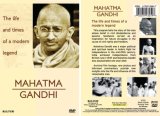| Reviews & Columns |
|
Reviews DVD TV on DVD Blu-ray 4K UHD International DVDs In Theaters Reviews by Studio Video Games Features Collector Series DVDs Easter Egg Database Interviews DVD Talk Radio Feature Articles Columns Anime Talk DVD Savant Horror DVDs The M.O.D. Squad Art House HD Talk Silent DVD
|
DVD Talk Forum |
|
|
| Resources |
|
DVD Price Search Customer Service #'s RCE Info Links |
|
Columns
|
|
|
Mahatma Gandhi
The next eight paragraphs of this review are filled with the obligatory political biography of Gandhi recounted in the documentary. Feel free to skip them.
Gandhi was born October 2, 1869 to the fourth wife of the Prime Minister of Porbandar, India. A Hindu, and of the business caste, Gandhi married at age 13, and sired five children. He studied law at University College London, and subsequently worked as a barrister in British colonial South Africa. Faced with racial discrimination in South Africa, Gandhi became increasingly politically radicalized. He led opposition to discriminatory British laws, and formed the Natal Indian Congress in South Africa. During the Second Boer War between the British Empire and the Boer republics, Gandhi organized a volunteer ambulance corps of 1100 Indians to support the British forces. Despite their demonstrated loyalty to the British Empire, the treatment of Indians in South Africa did not improve following the successful conclusion of the war. In South Africa, Gandhi developed the philosophy and practice of active non-violent resistance called Satyagraha. In 1906, Gandhi called upon his fellow Indians to defy a new law requiring registration of South Africa's Indian population, and to suffer the punishments for doing so without responding with violence. In the ensuing seven years, thousands of Indians including Gandhi were jailed and beaten for resisting the registration. Though Gandhi's efforts were only partially successful in blunting the discriminatory British laws, he gained great notoriety for his efforts and returned to India in 1915 as a respected civil rights figure. In India, Gandhi organized a tax revolt in the rural districts of Kheda and Champaran to protest oppressive conditions suffered by landless agricultural workers on British indigo plantations there. Though Gandhi's efforts were met with violence by the State, his disciplined movement did not retaliate in kind. Gandhi managed to secure significant concessions for the workers, and emerged from the conflict with a greatly strengthened reputation. Several more protest efforts against burdensome British taxes and laws followed, including Gandhi's famous walk 250 miles to the ocean to make salt to protest the tax on the salt trade. During this period Gandhi was arrested numerous times, and began using fasting as a weapon of protest. In all his efforts prior to World War II, Gandhi advocated improved conditions for the Indian people, but not a break with the British Empire. When Britain declared war on Germany, two million Indian lancers were activated to fight the Axis powers. Although Gandhi was initially supportive of the British war effort, he was persuaded by the leadership of the Indian National Congress to support the Indian Independence Movement. In response to non-cooperation with the war effort, the British Empire killed thousands of peaceful protesters and arrested more than a hundred thousand more, including Gandhi and nearly the entire Indian National Congress. Gandhi's wife died during his incarceration. He was released in 1944 due to ill health. At the conclusion of the war, a weary Britain finally conceded to independence for India, and Gandhi successfully negotiated the release of the remaining political prisoners. Gandhi strenuously resisted efforts to partition India into majority Hindu and Muslim nation-states, but despite his best efforts he was unsuccessful. The majority Muslim western states of India succeeded to form Pakistan. Millions of Muslims migrated west, while millions more Hindus migrated east following partition. Approximately half a million died in religious strife during this bloody period of transition, culminating in the Indo-Pakistani War of 1947. Gandhi's final major success was in going on a hunger strike in 1947 that succeeded in forcing a resolution to an impasse over payments due to Pakistan from India under the partition agreement. Alas, in 1948, Gandhi was slain by a fundamentalist Hindu student who blamed him for weakening India by favoring Muslim interests. Here concludes the political biography of Mohandas Karamchand Gandhi.
The musical score on this release is loud and seems to be culled from the music library of the Italian production house rather than created specifically for this documentary. Some of the music sounds approximately appropriate, while other bits such as the electronic industrial track are odd choices.
The Video:
Mahatma Gandhi is presented an aspect ratio of 1.33:1. The archival footage is of varying qualities but is generally fine.
The Audio:
The 2.0 audio track sounds a bit harsh at times and the volume of the score should be lower, but all in all, the audio is adequate. There are no optional subtitles on this release.
The Extras:
There are no extras on this release.
Final Thoughts:
Mahatma Gandhi is the kind of release that finds its way to public libraries, school classrooms, and to the various "history-lite" cable television channels. There's nothing inherently wrong with this kind of political biography. The facts, though highly circumscribed, are generally accurate and the newsreel footage is appealing, but there's nothing special here either. It's not as conventionally entertaining as Richard Attenborough's 1982 biopic Gandhi, or as insightful as Gandhi's own autobiography, My Experiments with Truth or his various collected writings, but if you've exhausted the better selections, you could do worse than spending an hour on this.
|
| Popular Reviews |
| Sponsored Links |
|
|
| Sponsored Links |
|
|
| Release List | Reviews | Shop | Newsletter | Forum | DVD Giveaways | Blu-Ray | Advertise |
|
Copyright 2024 DVDTalk.com All Rights Reserved. Legal Info, Privacy Policy, Terms of Use,
Manage Preferences,
Your Privacy Choices | |||||||














